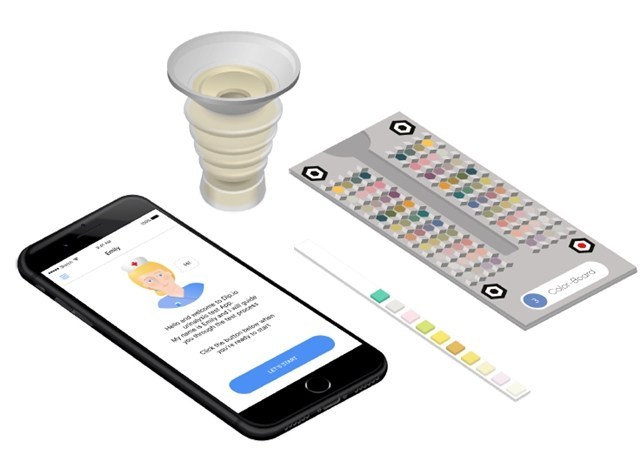An at-home smartphone-enabled urinalysis test is the latest example of a trend toward home diagnostics driving a surging medical technology market.
Urinalysis via Smartphone
Karen DiDonato • May 14, 2019
The last time I was asked to provide a urine sample, the CNA at my doctor’s office handed me a sealed cup, some wipes, and pointed me in the direction of the bathroom. This particular bathroom had a small metal door, maybe 12 inches square, with a sign that said “specimen here”. After I exited the bathroom, someone on the other side slid open the metallic door, and took the sealed specimen. I thought how handy and less embarrassing it was to be able to leave the filled cup in the bathroom instead of having to walk it through the office and hand it to the nurse.
Times have changed and the basic urinalysis is getting even easier.
An Israeli digital health startup, Healthy.io, created an FDA-cleared at-home smartphone-enabled urinalysis test that lets patients conduct clinical grade urine tests in the privacy of their own home.
Dip.io uses a disposable strip that patients dip into a cup of self-collected urine. After waiting for the strip to develop, they take a picture of it against a card using the company’s app. The image is anonymized and the results are reviewed by a healthcare professional.
It is currently only available in Israel and the U.K. at a pharmacy chain called Boots. In the US, a clinical trial began in April 2018 in conjunction with the National Kidney Foundation and Giesinger, an innovative health service organization serving more than 1.5 million patients in Pennsylvania and New Jersey.
The trial evaluated if home testing strategies (Dip.io) would be useful in improving proteinuria screening adherence since screening rates among hypertensive patients are low.
Proteinuria screening is recommended for patients with hypertension to screen for kidney disease and identify those at elevated risk for cardiovascular disease.
They found a high percentage of the participants were happy with the process and preferred it to getting tested in a medical setting. Of the participants that received an at-home kit, 71 percent adhered to testing, 98 percent succeeded with their test, and 89 percent reported they prefer in-home testing over testing at the doctor’s office. The majority said they would recommend home urine testing to a friend or colleague.
Dip.io integrated Siemens Healthineers urinalysis reagents into the product. According to the Dip.io website, “The dipstick measures 10 parameters, indicating a range of infections, chronic illnesses and pregnancy-related complications.”
While the mobile at-home testing technology is certainly new, the home-based medical test market is not. The first at-home pregnancy test appeared in the late 1970s.
Digital urinalysis is the latest example of a trend toward home diagnostics in the growing medical technology market.

